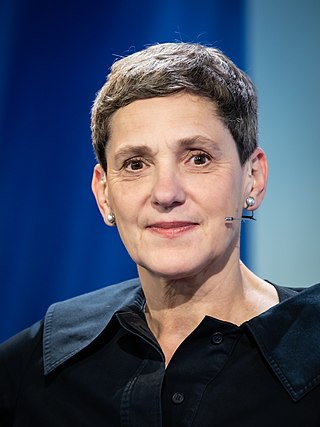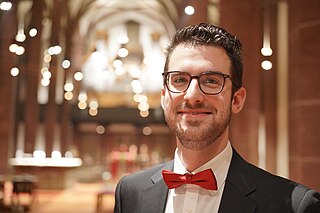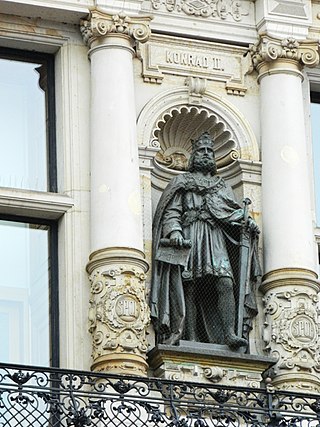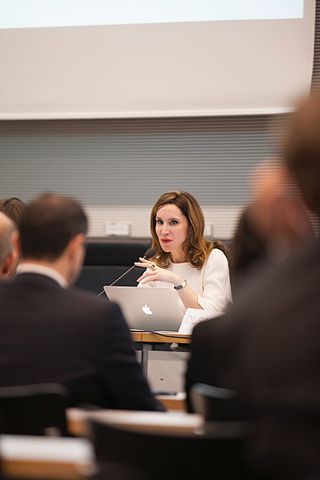
Leona Riemann (born November 28, 1952, Wiesbaden, West Germany) is a German writer, author, and publisher. [1] [2] [3]

Leona Riemann (born November 28, 1952, Wiesbaden, West Germany) is a German writer, author, and publisher. [1] [2] [3]
Raised in Wiesbaden, [4] Leona Riemann began her academic journey after completing her university-entrance diploma in 1971, delving into English and French literature for teaching at Johannes Gutenberg University in Mainz, and studying education at Johann Wolfgang Goethe University Frankfurt am Main. Following the conclusion of her studies in October 1984, Riemann embarked on a career in education, serving as a teacher until 2018. [5]
Since 1981, Leona Riemann has been active in the publishing and literary world, also writing under the pseudonym Anne Wolf. She took her passion for literature a step further by establishing the Hunsrücker publishing house in 2016.
Riemann, along with her family, has been residing in Gödenroth in the Hunsrück since 1997. [6]

Antje Vollmer was a German Protestant theologian, academic teacher and politician of the Alliance 90/The Greens. She became a member of the Bundestag in 1983 when the Greens first entered the West German parliament, before joining the party in 1985. From 1994 to 2005, she was Vice President of the Bundestag, the first Green in the position. She was a pacifist.

Ellen Lenneck was the writing pseudonym of Martha Julie Antoinette Helene Weichardt (1851–1880), a German author of novels and novellas. She was the only known daughter of novelist and literary editor Friederike Henkel, and a descendant from a family of industrialists and artists from Kassel and the Hesse region of Germany.

The Soonwald is a forested, low mountain region, up to 657.5 m above sea level (NN), which forms part of the Hunsrück mountains in the German Central Uplands. It lies within the counties of Rhein-Hunsrück-Kreis and Bad Kreuznach in the state of Rhineland-Palatinate.

Felicitas Hoppe is a German writer. She received the Georg Büchner Prize in 2012.

Werner of Oberwesel was a 16-year-old boy whose unexplained death was blamed on Jews, leading to revenge killings of Jews across Europe. He was venerated as a Christian saint, and his memorial day was 19 April.

Klaus Servene is a German writer who lives in Hamburg.

Julius Wolff was a German writer and poet. He enjoyed great popularity in Germany during the Gründerzeit. He was influenced by Joseph Victor von Scheffel. Lieder composer Pauline Volkstein (1849-1925) set his texts to music.

Christine Haidegger was an Austrian poet and writer whose memoir Zum Fenster hinaus was translated into English as Mama Dear. She was influential in the Salzburg literary scene.

Karl Gotthelf Lessing was a German mint director, comedy writer and the first biographer and estate manager of his brother Gotthold Ephraim Lessing. Among other things, he was the later owner of the Vossische Zeitung, which was still called "Royal Privilegirte Berlinische Zeitung of State and learned matters" at this time.

Wilhelm Klatte was a German music theoretician, pedagogue, journalist and conductor.
Hans-Jürgen Mende was a German historian. He was a lecturer in the history of philosophy at the Weißensee Academy of Art Berlin. After the reunification of Germany (1989/90) he became founder and managing director of the social and cultural-historical association Luisenstädtischer Bildungsverein, whose main aim was the research and spreading of the history of Berlin and Brandenburg.
Georg Gräner was a German composer and music critic.
Kurt Köster, also spelled Koetser, was a German librarian and historian.

Johannes M. Schröder is a German organist, composer and Catholic church musician. After several years responsible for the church music at the Westerwälder Dom, he moved to St. Bonifatius, Wiesbaden. He is also a lecturer and a music editor.

Conrad II was German king (1024–1039) and Holy Roman emperor (1027–1039). As founder of the Salian dynasty, he was a successful ruler who left his successor a stable monarchy. His behaviours in ecclesiastic affairs have caused some controversies even in his lifetime. He also left two notable architectural projects in the Speyer Cathedral and the Limburg Abbey. He is depicted several times in folk literature and fine arts.

Marlon Andreas Paul Bröhr is a German dentist and politician of the Christian Democratic Union (CDU). He was District Administrator of the Rhine-Hunsrück district from May 2015 to September 2021. He is a directly elected member of the 20th German Bundestag.

Richard Hugo Siepmann known as Hugo Siepmann was a German industrialist and patron. He was a member of the Siepmann industrial family, originally hailing from Hagen, Germany, known for worldwide activities in the steel, iron and coal industry. He was a majority shareholder and president of Siepmann. He was a long-time member and six year (1933-1939) president of the Chamber of Commerce and Industry (IHK). From 1939 he was appointed honorary president.

Georg Anton Dassel was a German industrialist, marble manufacturer, philanthropist and politician. Dassel was the majority owner of the Westphalian Marble Works. He served several terms as a member of the Landtag Province of Westphalia for the Arnsberg district. In 1887, Dassel acquired the historic neoclassical Dassel Mansion, and renovated it to its current state. His eldest son, Georg, Jr., married Margarete 'Grete' Siepmann, a daughter of Hugo Siepmann.
Baron Wilhelm Hugo von Spitzemberg was a German soldier who became a favourite of King Charles I of Württemberg.

Anabel Ternès is a German author and a professor of International Business Administration at the private university SRH Berlin University of Applied Sciences.